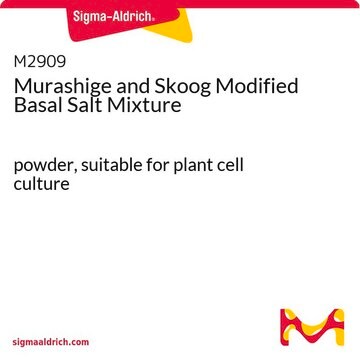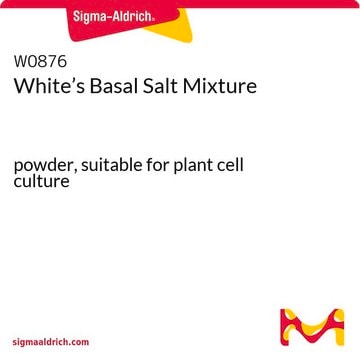M6899
Murashige and Skoog Basal Salts with minimal organics
powder, suitable for plant cell culture
Synonym(s):
MSMO
Sign Into View Organizational & Contract Pricing
All Photos(1)
About This Item
UNSPSC Code:
12352207
NACRES:
NA.72
Recommended Products
form
powder
Quality Level
technique(s)
cell culture | plant: suitable
application(s)
agriculture
storage temp.
2-8°C
Application
Murashige and Skoog medium is a widely used plant tissue culture growth medium. M&S Basal Medium contains macronutrients that include high levels of nitrate and organic additives such as agar, sugars, vitamins and growth regulators. Important growth regulators frequently added to M&S include IAA (auxin/morphogen) and the Kinetin (cytokinin/cell division promoter).
Formula variant
With the macro- and micronutrients, and vitamins as described by Linsmaier and Skoog (1965).
Media Formulation
Media Formulation
Quantity
Formulated to contain 4.4 grams of powder per liter of medium.
Preparation Note
Murashige and Skoog medium can be reconstituted from powder or by combining products that are major components of complete M&S medium, such as macronutrient mixtures and vitamin mixtures. Murashige and Skoog Shoot Multiplication Medium A (M6899 is a variant media) with macro- and micronutrients, vitamins as described by Linsmaier and Skoog.
Signal Word
Danger
Hazard Statements
Precautionary Statements
Hazard Classifications
Eye Irrit. 2 - Ox. Sol. 2
Storage Class Code
5.1B - Oxidizing hazardous materials
WGK
WGK 2
Flash Point(F)
Not applicable
Flash Point(C)
Not applicable
Personal Protective Equipment
dust mask type N95 (US), Eyeshields, Gloves
Certificates of Analysis (COA)
Search for Certificates of Analysis (COA) by entering the products Lot/Batch Number. Lot and Batch Numbers can be found on a product’s label following the words ‘Lot’ or ‘Batch’.
Already Own This Product?
Find documentation for the products that you have recently purchased in the Document Library.
Customers Also Viewed
Pyrroloquinoline quinone is a plant growth promotion factor produced by Pseudomonas fluorescens B16.
Okhee Choi et al.
Plant physiology, 146(2), 657-668 (2007-12-07)
Pseudomonas fluorescens B16 is a plant growth-promoting rhizobacterium. To determine the factors involved in plant growth promotion by this organism, we mutagenized wild-type strain B16 using OmegaKm elements and isolated one mutant, K818, which is defective in plant growth promotion
Li Wang et al.
Planta, 249(4), 1107-1118 (2018-12-16)
In hybrids of Arabidopsis, cotyledons influence the amount and proportion of hybrid vigor in total plant growth. We found Arabidopsis cotyledons are essential for plant growth and in some hybrids for hybrid vigor. In hybrids between C24 and Landsberg erecta
Alexandra Lešková et al.
PloS one, 15(8), e0237448-e0237448 (2020-08-14)
We established that Endosidin2 (ES2) affected the trafficking routes of both newly synthesized and endocytic pools of PIN-FORMED2 (PIN2) in Arabidopsis root epidermal cells. PIN2 populations accumulated in separated patches, which gradually merged into large and compact ES2 aggregates (ES2As).
Role of MPK4 in pathogen-associated molecular pattern-triggered alternative splicing in Arabidopsis.
Jeremie Bazin et al.
PLoS pathogens, 16(4), e1008401-e1008401 (2020-04-18)
Alternative splicing (AS) of pre-mRNAs in plants is an important mechanism of gene regulation in environmental stress tolerance but plant signals involved are essentially unknown. Pathogen-associated molecular pattern (PAMP)-triggered immunity (PTI) is mediated by mitogen-activated protein kinases and the majority
Thelma F Madzima et al.
Frontiers in plant science, 12, 694289-694289 (2021-09-08)
Plants respond to abiotic stress stimuli, such as water deprivation, through a hierarchical cascade that includes detection and signaling to mediate transcriptional and physiological changes. The phytohormone abscisic acid (ABA) is well-characterized for its regulatory role in these processes in
Our team of scientists has experience in all areas of research including Life Science, Material Science, Chemical Synthesis, Chromatography, Analytical and many others.
Contact Technical Service












